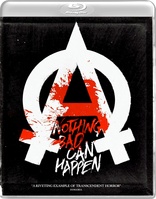Nothing Bad Can Happen Blu-ray Movie
HomeNothing Bad Can Happen Blu-ray Movie 
Tore Tanzt / Tipota kako de tha symvei / Rising / Blu-ray + Digital CopyDrafthouse Films | 2013 | 108 min | Not rated | Oct 14, 2014
Movie rating
6.6 | / 10 |
Blu-ray rating
| Users | 0.0 | |
| Reviewer | 4.0 | |
| Overall | 4.0 |
Overview
Nothing Bad Can Happen (2013)
Tore, a young man involved with an underground Christian punk movement called the Jesus Freaks, falls in with a family curious to test his seemingly unwavering religious faith. As his trials become more and more extreme, Tore finds his capacity for love and resilience pushed to its limits and beyond. Inspired by true events.
Starring: Julius FeldmeierDirector: Katrin Gebbe
| Foreign | Uncertain |
| Drama | Uncertain |
Specifications
Video
Video codec: MPEG-4 AVC
Video resolution: 1080p
Aspect ratio: 2.35:1
Original aspect ratio: 2.39:1
Audio
German: DTS-HD Master Audio 5.1 (48kHz, 24-bit)
Subtitles
English
Discs
50GB Blu-ray Disc
Single disc (1 BD)
Digital copy (as download)
Playback
Region A (B, C untested)
Review
Rating summary
| Movie | 4.0 | |
| Video | 4.5 | |
| Audio | 4.5 | |
| Extras | 3.0 | |
| Overall | 4.0 |
Nothing Bad Can Happen Blu-ray Movie Review
Through the Valley of the Shadow
Reviewed by Michael Reuben October 31, 2014Nothing Bad Can Happen (hereafter, "NBCH") is the debut feature by German writer/director Katrin Gebbe, whose original title was Tore Tanzt (literally, "Tore Dances"). It debuted at the Cannes Film Festival in May 2013, where it was accepted for screening after the official schedule had already been announced, and where the film was both booed and cheered. It's the kind of work to which viewers invariably have a strong reaction, and even those who respond favorably aren't necessarily eager to repeat the experience. You can easily finish the film without being certain whether you liked or loathed it, but either way you're likely to find scenes seeping back into your memory days after the experience, refusing to go away. Gebbe created "NBCH" from two sources. The first was a newspaper account of a terrible incident involving the mistreatment of a young man, which is why the film is said to be "inspired by true events". (According to Gebbe, the brutality of the real story was much worse than what she portrayed in NBCH.) The second source was Fyodor Dostoevsky's novel The Idiot, the hero of which is a simple and devout soul who attempts to live like Jesus in the modern world, with disastrous results. Gebbe combined these two notions into a story that raises difficult questions about the nature of good and evil—but that's really the wrong way to put it. Gebbe doesn't "raise questions" so much as shove the viewer's face into an experience of good and evil that some will simply find too unpleasant (or perhaps contrived) to want to endure. Whatever your reaction, Gebbe provides no easy answers. As powerful an experience as NBCH is, you have to process it for yourself.
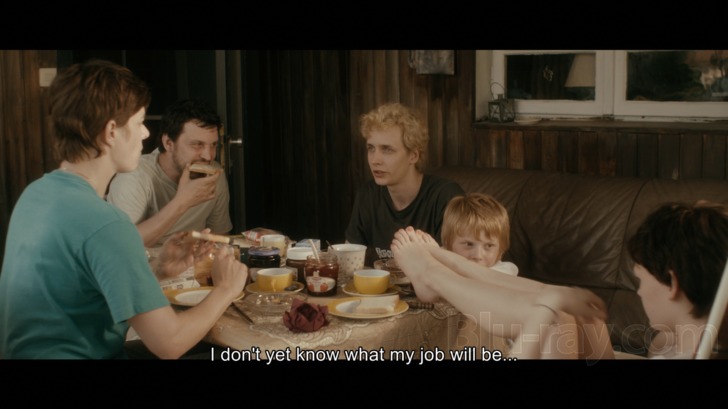
The central figure of NBCH is a young man named Tore, whom we first meet on a beach in Hamburg being baptized into a sect of born-again punk Christians who call themselves the Jesus Freaks. (This group actually exists.) It is a joyful experience for Tore, whose tousled blond hair bespeaks his indifference to convention or material well-being. He is direct, simple and earnest in a way that immediately fascinates people, although over time they tend to find him irritating, because he never changes. Throughout NBCH, we learn nothing of Tore's background. He could literally have dropped from heaven. He even has fits that he describes as being possessed by the Holy Spirit, but they are, in fact, epileptic seizures. Although Tore is currently staying with his friend and fellow Jesus Freak, Eule (Daniel Michel), in a house occupied by the group, a chance encounter introduces him to Benno (Sascha Alexander Gersak), his girlfriend Astrid (Annika Kuhl) and Astrid's two children from a prior relationship, fourteen-year-old Sanny (Swantje Kohlhof) and the little boy, Dennis (Til-Niklas Theinert). Benno finds the blond innocent intriguing and invites him to visit the garden shack where the makeshift family is spending the summer. When Tore quarrels with his friend Eule over Eule's failure to observe the sect's code of celibacy, Tore goes to stay with Benno and his family. Despite Astrid's hesitation, Benno adopts Tore like a stray dog. What happens next has a feeling of inevitability about it, which is a credit to Gebbe's filmmaking and the commitment of her cast. Benno's show of good nature turns out to be temporary. Underneath, he is a habitual bully. To a lesser extent, so is Astrid, who seems to be aroused by Benno's brutishness (or perhaps it makes her feel safe). Sanny is sullen and terrified, and it is more than likely that she has already been the victim of sexual abuse at Benno's hands. Little Dennis is simply detached and matter-of-fact. Tore's arrival gives Benno a new target, and by slow degrees he pushes the young innocent to see how much he'll take, beginning with a surprise punch in the face. Benno apologizes immediately, but he and Tore have started down a path together. By gradual steps, and then with rapid acceleration, they will proceed to test the limits of Tore's endurance, physically, psychologically and spiritually. But NBCH isn't a tale of imprisonment and abuse. Although Tore is initially surprised by Benno's violence, he eventually submits to being mistreated in a kind of Christ-like emulation. He has adopted "love your enemies" and "turn the other cheek" in the most literal fashion possible. He also believes that God has assigned him the task of protecting Sanny—if necessary, by taking Benno's abuse in her place. Even when, partway through the film, Tore has a clear chance to escape from Benno's grasp unharmed, he voluntarily returns to a situation that he knows is mortally dangerous. (Benno, seeing Tore come back, realizes that he can become even more cruel.) It does not give anything away to say that Tore succeeds in his assigned "task" of protecting Sanny, at least after a fashion. It also is not a spoiler to reveal that he pays a heavy price in the process, just as Jesus did for taking on the sins of mankind. What is perhaps most disturbing about NBCH is the many individuals who witness the torments that Benno inflicts on this simple, open and gentle soul, not one of whom (except Sanny, who is powerless) comes to Tore's aid. Even worse, they join in the "entertainment", and Gebbe and her cast present the story so that you find it entirely credible that events might unfold in just this twisted fashion.
Nothing Bad Can Happen Blu-ray Movie, Video Quality 
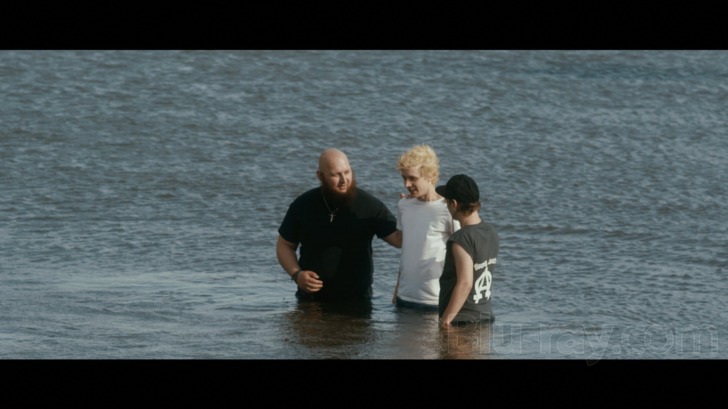
Nothing Bad Can Happen was shot by Moritz Schultheiß, whose credits are mostly low-budget horror fare like Rammbock: Berlin Undead. It's an appropriate match, since NBCH has the pacing and tense atmosphere of a horror film. According to IMDb, the film was photographed with a Red One MX, which is consistent with the image on Drafthouse/Cinedigm's 1080p, AVC-encoded Blu-ray, which was presumably sourced from digital files. The image is clean, sharp and detailed, with solid blacks and a naturalistic color palette that is consistent with the film's documentary style. Much of the photography is handheld, although director Gebbe avoids the lurching style that has come to be known as "shaky cam". She simply follows Tore in and out of real locations, many of them mundane, a few of them quite the opposite. Because the camera is so frequently in motion, the disc's high average bitrate of 31.96 Mbps is a welcome use of the available digital real estate, even if good results could have been achieved with less bandwidth, because the material was digitally acquired. If the space is there, why not use it?
Nothing Bad Can Happen Blu-ray Movie, Audio Quality 
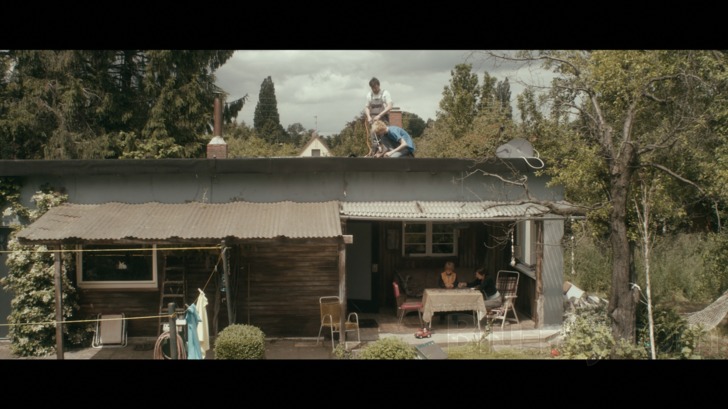
NBCH's 5.1 soundtrack (in German with optional English subtitles) is encoded in lossless DTS-HD MA, and it's a powerful experience. Gebbe asked composer Peter Folk to supply an unconventional score, and Folk responded with music that could easily be mistaken for sound effects: deep bass notes that could signal a spiritual awakening from above (or possibly a threat from below), unconventional and unmelodic phrases that seem to arise out of Tore's internal dialogue, and sustained notes that blend into the background of the action on screen. It's an ideal film score, because it contributes to NBCH's total impact without calling attention to itself. At the end, you may not even realize there was music. My German is good enough to judge that the dialogue is clearly reproduced, and the track draws a clear sonic distinction between Tore's internal thoughts and the lines that are spoken aloud to other characters. The essential sounds of the environment are carefully blended into the mix; a standout is the club scene that is part punk dance, part sermon.
Nothing Bad Can Happen Blu-ray Movie, Special Features and Extras 
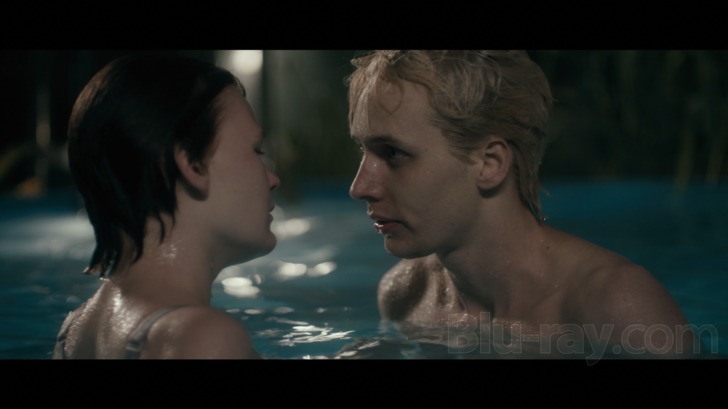
- The Making of Nothing Bad Can Happen: An Interview with Katrin Gebbe (720p; 1.78:1; 11:38): The writer/director discusses the origin of the project, its development and its reception.
- Tore Tanzt: An Interview with Julius Feldmeier, Katrin Gebbe and Verena Gräfe-Höft (1080p; 1.78:1; 12:06): Interviewed separately, the film's star, its writer/director and its producer discuss different aspects of the film. Feldmeier, who is almost unrecognizable out of character, provides thoughtful commentary on Tore and describes playing him. Gebbe and Gräfe-Höft discuss the challenges of making the film, especially in casting the major roles.
- Trailers
- Nothing Bad Can Happen Theatrical Trailer
- The Act of Killing
- Borgman
- Pieta
- Wake in Fright
- Booklet: As usual, Drafthouse has included an informative booklet containing disc credits, stills from the film and, most importantly, an informative interview with Gebbe and Gräfe-Höft that further explores the making of the film and its elusive subject matter.
Nothing Bad Can Happen Blu-ray Movie, Overall Score and Recommendation 
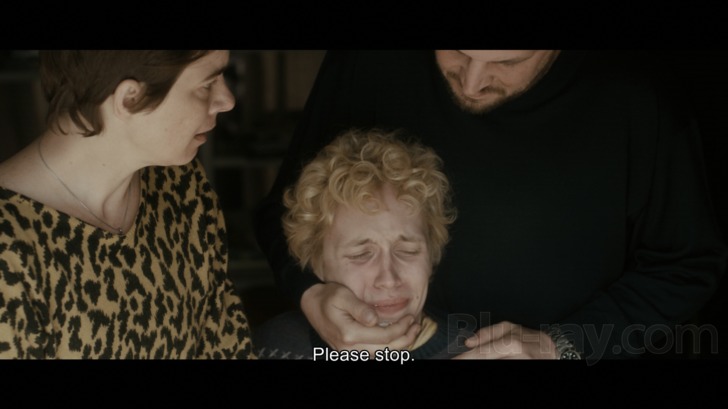
On its technical merits, I have no hesitation recommending NBCH. Drafthouse produces excellent discs, and this one is no exception. As a film, though, NBCH is one to be approached with caution. It is a startling and original work, but it is definitely not a blind buy. Enter at your own risk.
Similar titles
Similar titles you might also like

The Club
El Club
2015

In a Glass Cage
Tras el cristal
1986

I Declare War
2013

Martyrs
2008

Audition
オーディション | Ôdishon | Special Edition
1999

The Lesson
2015

Possession
Special Edition
1981

Fairy in a Cage
檻の中の妖精 / Ori no naka no yôsei / The Nikkatsu Erotic Films Collection
1977

Of Unknown Origin
1983

Goodnight Mommy
Ich seh, Ich seh
2014

Trauma
2017

Naked Violence
I ragazzi del massacro
1969

The Nameless
Los sin nombre
1999

Witchhammer
Kladivo na čarodějnice / Witches' Hammer / The Witch Hunt
1969

Born for Hell
Naked Massacre / Die Hinrichtung
1976

Mon Mon Mon Monsters!
Guai guai guai guaiwu!
2017

Goto, Isle of Love
Goto, l'île d'amour
1969

Calvaire
The Ordeal / Slipcover in Original Pressing
2004

The Eyes of My Mother
2016

Siberia
2020
